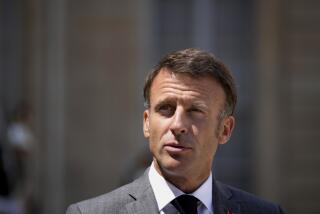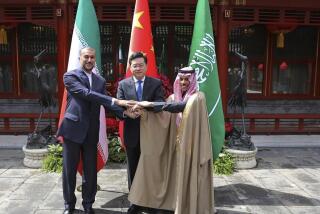France, Iran to Restore Diplomatic Ties : Acrimony Eased as Part of Deal for Release of Beirut Hostages
- Share via
PARIS — France announced Wednesday that it will restore diplomatic relations with Iran, ending almost a year of confrontation that began in acrimony and theatrics but eased as part of the price paid for release of the French hostages in Beirut.
Jean Gueguinou, spokesman for the Ministry of Foreign Affairs, said the formal resumption of relations will take place today, with ambassadors taking up their posts in Tehran and Paris soon afterward.
Iranian Prime Minister Hussein Moussavi made the same announcement in Tehran. He said the agreement, negotiated by French and Iranian officials in Geneva, was based “on healthy principles and on respect for the independence of the two countries.”
The move had been expected for more than a month, but its announcement is sure to provoke the anger of critics, among them the British government, who believe that France paid too high a price to free the hostages.
The last three French hostages were released by pro-Iranian Shia Muslim extremists in Beirut on May 4, four days before the final round of voting in the French presidential election. It was widely believed that Jacques Chirac, a presidential candidate and then premier, had worked feverishly to bring about their release in hope of turning the election around. Despite this, President Francois Mitterrand defeated Chirac by a decisive margin.
Chirac, when he welcomed the freed hostages in Paris on May 5, thanked the Iranian government for its help and promised that the resumption of diplomatic relations “can be envisaged.”
‘Word Will Be Honored’
After the election, Mitterrand said that “the word of France, now that it has been given, will be honored.” Premier Michel Rocard, appointed by Mitterrand to replace Chirac, said, “My government and the president do not intend to pass judgment on the conditions under which these negotiations took place.”
In addition to promising a resumption in relations, France made the final repayment on a loan of $1 billion from the late Shah Mohammed Reza Pahlavi of Iran before the 1979 Iranian revolution. News reports said that payment of ransom to the abductors and the future release of a pro-Iranian terrorist from a French jail were also part of the deal, but this was denied by the French government.
The dramatic break with Iran occurred last July after French gendarmes surrounded the Iranian Embassy in Paris and tried to force a mysterious Iranian official named Wahid Gordji to come out. The siege made the fashionable neighborhood look like a war zone.
Gordji, officially listed as an interpreter but reportedly an Iranian intelligence agent, was accused by French officials of complicity in a series of bombings that terrorized Paris in September, 1986, and killed 11 people. Gordji refused to leave the embassy and submit to questioning by the investigating judge in the case.
In retaliation for the siege, Iran charged a French diplomat, Paul-Marie Torri, with engaging in espionage and surrounded the French Embassy in Tehran. On July 17, after long consultations between Mitterrand and Chirac, France broke diplomatic relations. Feelings between the two countries were tense and bitter.
The mood softened four months later, in late November, when the pro-Iranian Shias released two French hostages in Beirut. Two days after that, Gordji left the Iranian Embassy, rushed to the Palace of Justice in Paris, submitted to questioning by the investigating judge and walked out of the judge’s office without any charge being made against him.
At the same time, Iran announced the dropping of espionage charges against Torri. France then flew Gordji to Pakistan, Iran flew Torri there, and the two officials were exchanged.
France denied that there was any deal. But the deal appeared so obvious that British Prime Minister Margaret Thatcher attacked Chirac in the House of Commons for breaking ranks with other Western nations, which had refused to bargain with Iran or the abductors on the issue of hostages. Chirac drew a reprimand from the U.S. State Department as well.
After the lifting of the embassy siege and the release of Gordji, French officials continued to negotiate with the Iranians, and this culminated in the release of the last three hostages in the final days of the presidential election campaign.
In all, 10 French hostages were released during the two years of the Chirac government. An 11th died in captivity.
More to Read
Sign up for Essential California
The most important California stories and recommendations in your inbox every morning.
You may occasionally receive promotional content from the Los Angeles Times.












